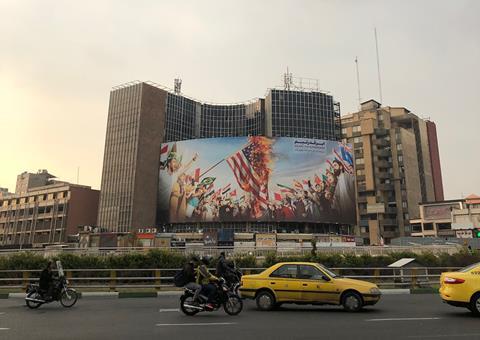CPH and Berlinale winner is an intimate celebration of everyday resistance in modern Iran

Dir: Farahnaz Sharifi. Germany/ran. 2024. 82mins
Farahnaz Sharifi’s essay film opens up a world of personal, private and public rebellion against the Iranian regime over her lifetime. Born just three weeks after the Islamic Revolution overthrew the Pahlavi dynasty, the documentarian uses her experiences of childhood and beyond to give shape and an intimate diary feel to a story of resistance that she suggests is replicated in households across her homeland.
Shows how the very act of filming becomes an act of resistance
The film has already proved popular with audiences after its world premiere in Berlin, where it came second to No Other Land for the Panorama Audience Award. Its top prize Golden Alexander win at Thessaloniki International Documentary Film Festival coupled with its topicality regarding the Women Life Freedom protests over rights should cement further festival play and help it catch the eye of distributors.
Framed by women’s protests stretching back to a Women’s Day demo against the mandatory hijab in 1979 right up to contemporary events, the planet of the film’s title refers to the private universe that, explains Sharifi’s narration, exists behind closed doors. It is a place where she is seen smiling in colourful photos or footage with her family – a world away from black and white pictures from the outside world of Iran that capture her in a succession of hijabs. She condemns the head covering as an item that holds “all of their power to control all of our lives”.
This is not just a personal document, however, as Sharifi is a keen collector of found footage. “I buy people’s memories,” she says. These fragments of lives, with an emphasis on parties, dancing and family celebrations in general, only exist, Sharifi contends, because those who filmed them fled the country in the wake of the revolution. Those who stayed, she claims, would have to destroy these sorts of recordings to protect themselves.
Beyond the country’s politics, Sharifi lets this forced collective forgetfulness enter into a dialogue with her own experience of life with her mother, who is slowly succumbing to Alzheimer’s. This acts as a further spur to the director’s drive to preserve the past. Sharifi also forges a friendship with an US-based academic, Leyla, who fled Iran at 15 with her family after their house was confiscated. Leyla’s sense of duality about her life inside the country and out of it gains increasing resonance as Sharifi considers the scattered diaspora through the course of the film.
Sharifi shows how the very act of filming becomes an act of resistance and, via visceral footage, an act of defiance that can cost you your life. But if her film brings home the horror of regime oppression, it also celebrates the many moments of joy that refuse to be thwarted. Her fluid editing allows a conversation to build between the public and the private, the past and the present. Women dance and sing together at home and, at a party that has just had a visit from the security forces, someone notes they can get a picture of the Ayatollah Khomeini framed and on the wall within minutes if they have to. Dancing, though criminalised, becomes a vital show of dissent.
Some of Sharifi’s arguments recall earlier documentaries from her homeland, including The Green Wave and Iran: Voices Of The Unheard, but her diary approach and willingness to appear on camera even at extreme moments of sorrow give it an immediacy. Atmospheric sound design from Daniel Wulf helps to bring a sense of movement and life to archival photos, while Atena Eshtiaghi’s score gently supports the various shifts in emotional tenor.
Sharifi never makes light of the brutal oppression of the Iranian regime or the bleak realities of protest against it but she nevertheless suggests that, despite it all, the population still take every opportunity they can to dance to their own tune.
Production companies: Jyoti Film
International sales: Cat & Docs info@catndocs.com
Producers: Anke Petersen, Lilian Tietjen, Farzad Pak
Cinematography: Farahnaz Sharifi
Editing: Farahnaz Sharifi
Music: Atena Eshtiaghi
























